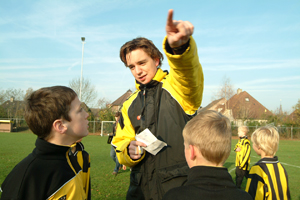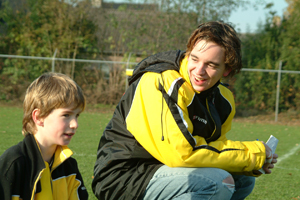| 14. Letters |
| |
| |
| To the ministers of the Netherlands |
| |
| Dear Ministers, |
| |
| In four years’ time making plans, executing them and justifying them relates very badly to the idea of durability. In order to serve the interests of and with the next generation a more ecological approach is conditional rather than a political one. The future is unpredictable. Protect the youngest and the weakest and open the dialogue with those who come after us. The highest attainable is to practise the shared values that are connecting us. |
| |
| A lot of success |
| |
| M.v.H. |
| |
| |
| |
| To all the teachers, lecturers, counsellors |
| |
| Dear teacher, lecturer, counsellor, |
| |
| Being allowed to educate and counsel children to their full growth is ‘a beautiful task.’ |
| Circumstances can hinder the task. But the time that we can exclude people has definitely gone. We may simply miss nobody anymore. One person is able to disrupt (parts of ) a society. Linkedness is the biggest task. Starting relationships which increase the chance that everybody is seen and heard, diminished the chances of disconnections. No talent may be lost. But those talents only become visible and palpable in meaningful interactions. Give priority to that primary task. The rest is for justifying, what you do not start if you are keeping to the policy, what does not communicate with the next generation. |
| |
| Have much fun. |
| |
| M.v.H. |
| |
| |
| |
| To all the children |
| |
| Dear children, |
| |
| Live, play, learn, enjoy! The world is yours. Take good care of yourself, the other person and the world. Think that you can make yourself and the world more beautiful by discovering and using the talents that you have. Also think that there will be a generation after you which wants that again too and do not forget that there was a generation before you which has revealed the possibilities that you have now. You will have to do it yourself but never without others. Make friends. Get to know yourself and as many others as possible which will make the world understand itself because of you. |
| |
| Live! |
| |
| M.v.H. |
| |
| |
| |
| To the Teacher Training Colleges |
| |
| ‘Pedagogic in the region’ must be that of the Teacher Training College |
| In 2007 the Committee Teachers presented its report about the approach of the lack of teachers, the position of the teacher and the quality of the teacher. The report was offered to Education Secretary Plasterk and the ministers of state Dijksma and van Bijsterveldt by the chairman Alexander Rinnooy Kan. The advice of the Committee Teachers is aimed at a structural improvement of being a teacher. Alexander Rinnooy Kan: “The Netherlands are heading for a dramatic quantitative lack of qualitatively good teachers.” This article is about the new role of the Teacher Training College. This story is also about money but above all it is about something else. |
| |
 |
|
Do not generalize, do not individualize |
| The next seven years 75 % of the teachers will leave secondary education. The number of students ant the Teacher Training Colleges declines. Boys can hardly be found there. Far too many pupils from Lower Vocational Education play truant and leave school prematurely and without a certificate. The percentage of relapses in juvenile prisons has increased during the past few years. A flood of negative news is poured out over us daily. Not that these news items are beside the truth by definition but it has increased the pressure on police, justice, welfare and (especially) education. The media did not only reveal the problems in all clarity but have also increased the unattractiveness of these profession groups with their way of presenting things. The negative image-building refers as well to the population (the troublesome pupils) as to the professional (the incompetent student and teacher). In the outlined image all problems are generalised to ‘the foreigner’, ‘the pupil at Lower Vocational Education’, ‘the student at the Teacher Training College.’ |
| Education (and other social workers) often has an individualised answer to the outlined problems from a narrow diagnostic perspective. Children get special care grants, remedial teaching, individual counselling or even worse: they are excluded or de-linked from the current systems. Schools (or institutions) which work from the old paradigm have a rough view of the problems and an individual approach for the problems. Schools which have ‘turned over’ and which are looking permanently for new tunings make a shaded view of reality as well as possible. In their interactions they try to consider ‘the learning person’ in relation to the total context. |
| |
In a teachers’ room at a Lower Vocational College I recently heard some teachers giving a very shaded analysis of a football match. When the conversation bent to the pupils in their classes they were talking about ‘today’s youth’.
|
| |
| |
| Developing educationalists become visible |
| Rinnooy Kan outlines a two-sided problem. A quantitative and qualitative problem. Education is assailed especially by quantitative standards at the moment: the Cito test for group 8, the number of pupils needing special care, the number of foreign children, the language and arithmetic tests for students of the Teacher Training Colleges, the ranking of schools on the internet etc. This can be translated in contents into the attention for the ‘measurable’ achievements. Didactics, methodology, management and educational science are largely given priority over pedagogy. By this we suggest that man is an object in his interaction. But nothing is less true. In every interaction man is a subject that is changeable and formable. |
| The renewed attention for pedagogy is the key to progress. Children that become de-linked are able to show delinquent behaviour. Children that are linked with themselves, with others and their school, their area or their club live peacefully together. And that is the basis for a developing society. But that requires pedagogic connectors. People who can value the needs of the children, people who have attention and time for them, people who have affinity with their play and their lives. And especially in that area the ‘developing educationalists’ announce themselves. Youngsters that have a feeling for a constructive morale and a feeling for the authenticity of children. The primus inter pares among youth. There the new students for the Teacher Training Colleges should become visible. A relation between Teacher Training Colleges and the clubs in areas, sport-clubs and youth-clubs can make these young people (also boys!) put the logical step in the direction of an educational training. |
| |
The task of volunteers at sport-clubs and youth-clubs is often difficult and always very responsible.
|
| |
| |
| The relevant pedagogy of the region |
| But of course that relation is not only useful with reference to new growth. From a social point of view that relation is also relevant the other way round. There are pupils of primary and secondary education that cause problems outside school, in the area or at sport-clubs and youth-clubs. Sometimes because there is no supervision or guidance or because children uninhibitedly make problem ‘wherever they are’. But sometimes also because the counsellors have no feeling for the needs of those children. Then pedagogic support would be welcome. The areas and the clubs know their population and the problems. The municipalities have their statistics. However, some organisations have insufficient means to tackle those problems adequately. There the students of the Teacher Training Colleges ‘the future educationalists’ could give a constructive and useful contribution. The Teacher Training College can do more than it does now, taking its social responsibility by not purely aiming at school and its didactics to match but with more attention for the relevant ‘pedagogy of the region’. The Teacher Training College should be the pedagogic heart of the region. The institute that knows the real problems of the region and the institute that attracts students who know the pedagogic feeling from their environment. The Teacher Training College can recruit youngsters from neighbourhood work, sport-work and youth-work but can serve that same neighbourhood work, sport-work and youth-work. |
| |
| |
 |
|
Demand and offer of pedagogic counselling |
| A number of Polytechnics has a self-evident function in the region already during the training. Especially exclusive vocational trainings have a direct relation with the hinterland of their subject. Students of Art Academies are already called in to give performances even before they have graduated. Their budding talent is recognized by ‘the market’. That is visible and audible and can literally be presented. The Teacher Training College is not purely an institute that crams students for teaching. The curriculum may not be narrowed to an objective, measurable, didactic model. The Teacher Training College should be the institute that recognizes its environment in its pedagogic order, the institute that has a central role in demand and offer of pedagogic counselling. |
| |
| |
| The training together with students and youth |
| The new Teacher Training Colleges can bend negative statistics in cooperation with municipalities. |
| |
| Students of Teacher Training Colleges could work as volunteers or paid worker in areas or at sport-clubs or youth-clubs. These constructs should not depend on study points but since that system has been created it is sensible to include these efforts in the ‘competence-aimed education’. This kind of ‘elsewhere acquired competence’ are relevant and should get a legitimate place in the developing professional profile of the student of a Teacher Training College. The Teacher Training College itself could be a place where children’s camps are organized for children who cannot go away in the holidays. A place where children’s lectures about special subjects are given to interested children. Trainings to become defensible, workshops, homework counselling etc. More examples can be restricting for the image- building of students. The students talk about ‘their area’, they tell what children it is about and must be able to come to activities together with those youngsters from their interaction with them. Activities they want to be responsible for together. Even there where school boards are wrestling with an introduction of daily arrangements according to policy, ambitious students of Teacher Training Colleges can learn and have others learn! |
| |
In a reflection assignment of a student of a Teacher Training College one could read: ‘Since I have counselled a reading project to mentally handicapped adults I have acquired a much wider and deeper view on education.’
|
| |
| |
| The Teacher Training College as a beating, pedagogic heart |
| If we want to get a shaded view in the analysis of youth problems and not enter into generalization and if we want to view children from the total context in the approach, then connections are needed with and around the child. The school, the neighbourhood, the sport-club and the youth-club which form the context benefit from pedagogic counsellors. The teachers at Teacher Training Colleges (professionals) can form a pedagogic network in the region together with the students of the Teacher Training Colleges (potentials) following wider school constructs. The pedagogic settings get support from the training students. In those places the new potentials appear. So it cuts both ways. The responsible institute school recognize a useful challenge in this. |
| |
| Kind regards |
| |
| M.v.H. |
| |
| |
| |
‘When it is good the fun is not in the subject-matter but in the learning.’
Midas Dekkers, De Larf (2002)
|
| |
| |

